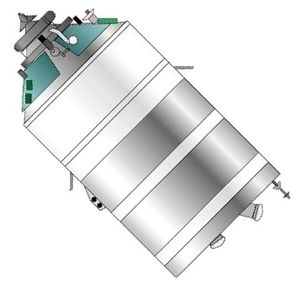
Home - Search - Browse - Alphabetic Index: 0- 1- 2- 3- 4- 5- 6- 7- 8- 9
A- B- C- D- E- F- G- H- I- J- K- L- M- N- O- P- Q- R- S- T- U- V- W- X- Y- Z
37KS
 37KD Credit: © Mark Wade |
Status: Cancelled 1983. Payload: 3,000 kg (6,600 lb). Gross mass: 20,000 kg (44,000 lb). Span: 4.20 m (13.70 ft).
Development of a new kind of Soviet space station module, designated 37K, was authorized on 17 September 1979. The basic 37K design consisted of a 4.2 m diameter pressurized cylinder with a docking port at the forward end. It was not equipped with its own propulsion system. The original authorization was for a total of eight 37K's of various configurations.
- Four 37KS modules for Mir. These would also be launched by Proton and delivered and docked to the station by a new lighter weight FGO tug.
- One experimental 37KE. This would be launched by a Proton booster together with a surplus FGB module (from the cancelled Chelomei TKS manned ferry). The FGB would serve as a tug to deliver and dock the 37KE to the front port of the Salyut 7 space station.
- Three 37KB modules. These would be carried in the payload bay of the Buran space shuttle. They could remain attached to the bay or (modified to the 37KBI configuration) docked to the Mir or Mir-2 space stations using the Buran manipulator arm.
- 37KD - this module was equipped with an airlock and large hatch at the aft end to allow cosmonauts to conduct spacewalks from Mir.
- 37KT - the technological module was to be equipped with materials processing experiments and was equipped with a docking port for the Buran space shuttle.
- 37KP - this applications module was to be equipped with earth resources and military reconnaissance sensors.
- 37KG - this cargo module would deliver experiments to Mir too heavy for the Progress resupply ship.
Habitable Volume: 37.00 m3.
Family: Soviet Space Stations, Space station, Space station orbit. Country: Russia. Launch Vehicles: Energia. Agency: Korolev bureau.
- 37K space station module authorised - .
Nation: Russia.
Spacecraft: 37KB,
37K-Mir,
37KS,
Kvant,
LO,
NPG.
The basic 37K design consisted of a 4.2 m diameter pressurised cylinder with a docking port at the forward end. It was not equipped with its own propulsion system. The original authorisation was for a total of eight 37K's of various configurations. Of these, only the 37K-E (Kvant module of Mir) and the 37KS (instrumentation module in Buran) would fly.
1981 February 11 - .
- Production of the Production of four 37KS modules for Mir approved - .
Nation: Russia.
Spacecraft Bus: Mir.
Spacecraft: 37KS.
Production of the four 37KS modules was approved following review of the draft projects. The four modules would be placed into orbit by a Proton launch vehicle. An FGO tug section, connected to the 37KS module by a light lattice structure, would rendezvous with the Mir station and dock the module to one of the radial ports of the Mir station. It would then separate and deorbit itself into the earth's atmosphere. The plan was that production of all of the modules would be completed in 1984. They would be assembled with the Mir base block in one year and have an operational lifetime of five years.
1983 November - .
- 37KS Modules for Mir cancelled, replaced by FGB modules. - .
Nation: Russia.
Spacecraft: 37KS,
Kristall,
Kvant,
Kvant-2,
Mir,
Priroda,
Spektr.
Design and fabrication reached an advanced phase when it was decided that the separate tug concept resulted in too low a net scientific payload (3 tonnes). Integrating the tug with the module was expected to increase this to 5 tonnes and provide some reserve engine capability at Mir and additional pressurised volume. Accordingly the 37KS modules for Mir were cancelled. Work on the 37KE experimental module (Kvant) and the 37KB Buran modules continued. The function of the 37KS modules was taken up by modules by KB Salyut derived from the FGB. A competing proposal from NPO Energia for a unified spacecraft that combined the 37KS module with the engine unit of Mir was rejected.
Back to top of page
Home - Search - Browse - Alphabetic Index: 0- 1- 2- 3- 4- 5- 6- 7- 8- 9
A- B- C- D- E- F- G- H- I- J- K- L- M- N- O- P- Q- R- S- T- U- V- W- X- Y- Z
© 1997-2019 Mark Wade - Contact
© / Conditions for Use
